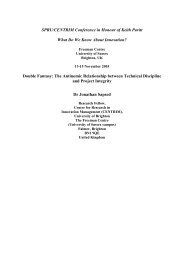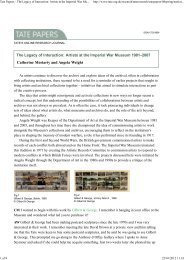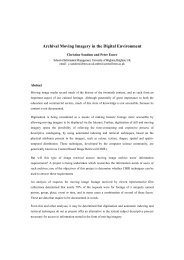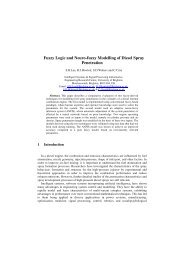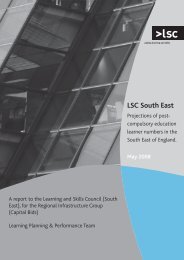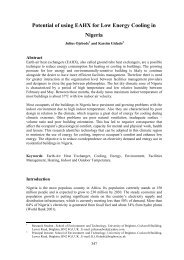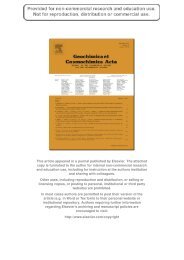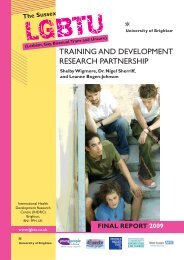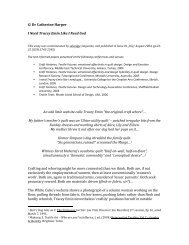a randomised controlled trial (MATISSE). - ResearchGate
a randomised controlled trial (MATISSE). - ResearchGate
a randomised controlled trial (MATISSE). - ResearchGate
Create successful ePaper yourself
Turn your PDF publications into a flip-book with our unique Google optimized e-Paper software.
ii NIHR Health Technology Assessment programme<br />
The Health Technology Assessment (HTA) programme, part of the National Institute for Health Research (NIHR), was<br />
set up in 1993. It produces high-quality research information on the effectiveness, costs and broader impact of health<br />
technologies for those who use, manage and provide care in the NHS. ‘Health technologies’ are broadly defined as all<br />
interventions used to promote health, prevent and treat disease, and improve rehabilitation and long-term care.<br />
The research findings from the HTA programme directly influence decision-making bodies such as the National<br />
Institute for Health and Clinical Excellence (NICE) and the National Screening Committee (NSC). HTA findings also<br />
help to improve the quality of clinical practice in the NHS indirectly in that they form a key component of the ‘National<br />
Knowledge Service’.<br />
The HTA programme is needs led in that it fills gaps in the evidence needed by the NHS. There are three routes to the<br />
start of projects.<br />
First is the commissioned route. Suggestions for research are actively sought from people working in the NHS, from<br />
the public and consumer groups and from professional bodies such as royal colleges and NHS trusts. These suggestions<br />
are carefully prioritised by panels of independent experts (including NHS service users). The HTA programme then<br />
commissions the research by competitive tender.<br />
Second, the HTA programme provides grants for clinical <strong>trial</strong>s for researchers who identify research questions. These<br />
are assessed for importance to patients and the NHS, and scientific rigour.<br />
Third, through its Technology Assessment Report (TAR) call-off contract, the HTA programme commissions<br />
bespoke reports, principally for NICE, but also for other policy-makers. TARs bring together evidence on the value of<br />
specific technologies.<br />
Some HTA research projects, including TARs, may take only months, others need several years. They can cost from as<br />
little as £40,000 to over £1 million, and may involve synthesising existing evidence, undertaking a <strong>trial</strong>, or other research<br />
collecting new data to answer a research problem.<br />
The final reports from HTA projects are peer reviewed by a number of independent expert referees before publication in<br />
the widely read journal series Health Technology Assessment.<br />
Criteria for inclusion in the HTA journal series<br />
Reports are published in the HTA journal series if (1) they have resulted from work for the HTA programme, and<br />
(2) they are of a sufficiently high scientific quality as assessed by the referees and editors.<br />
Reviews in Health Technology Assessment are termed ‘systematic’ when the account of the search, appraisal and<br />
synthesis methods (to minimise biases and random errors) would, in theory, permit the replication of the review<br />
by others.<br />
The research reported in this issue of the journal was commissioned by the HTA programme as project number<br />
04/39/04. The contractual start date was in November 2006. The draft report began editorial review in December 2010<br />
and was accepted for publication in June 2011. As the funder, by devising a commissioning brief, the HTA programme<br />
specified the research question and study design. The authors have been wholly responsible for all data collection,<br />
analysis and interpretation, and for writing up their work. The HTA editors and publisher have tried to ensure the<br />
accuracy of the authors’ report and would like to thank the referees for their constructive comments on the draft<br />
document. However, they do not accept liability for damages or losses arising from material published in this report.<br />
The views expressed in this publication are those of the authors and not necessarily those of the HTA programme or the<br />
Department of Health.<br />
Editor-in-Chief: Professor Tom Walley CBE<br />
Series Editors: Dr Martin Ashton-Key, Professor Aileen Clarke, Dr Tom Marshall, Professor John Powell,<br />
Dr Rob Riemsma and Professor Ken Stein<br />
Associate Editor: Dr Peter Davidson<br />
Editorial Contact: edit@southampton.ac.uk<br />
ISSN 1366-5278 (Print)<br />
ISSN 2046-4924 (Online)<br />
ISSN 2046-4932 (DVD)<br />
© Queen’s Printer and Controller of HMSO 2012. This work was produced by Crawford et al. under the terms of a<br />
commissioning contract issued by the Secretary of State for Health.<br />
This journal is a member of and subscribes to the principles of the Committee on Publication Ethics (COPE) (http://www.<br />
publicationethics.org/).<br />
This journal may be freely reproduced for the purposes of private research and study and may be included in professional<br />
journals provided that suitable acknowledgement is made and the reproduction is not associated with any form of advertising.<br />
Applications for commercial reproduction should be addressed to: NETSCC, Health Technology Assessment, Alpha House,<br />
University of Southampton Science Park, Southampton SO16 7NS, UK.<br />
Published by Prepress Projects Ltd, Perth, Scotland (www.prepress-projects.co.uk), on behalf of NETSCC, HTA.<br />
Printed on acid-free paper in the UK by the Charlesworth Group. G





